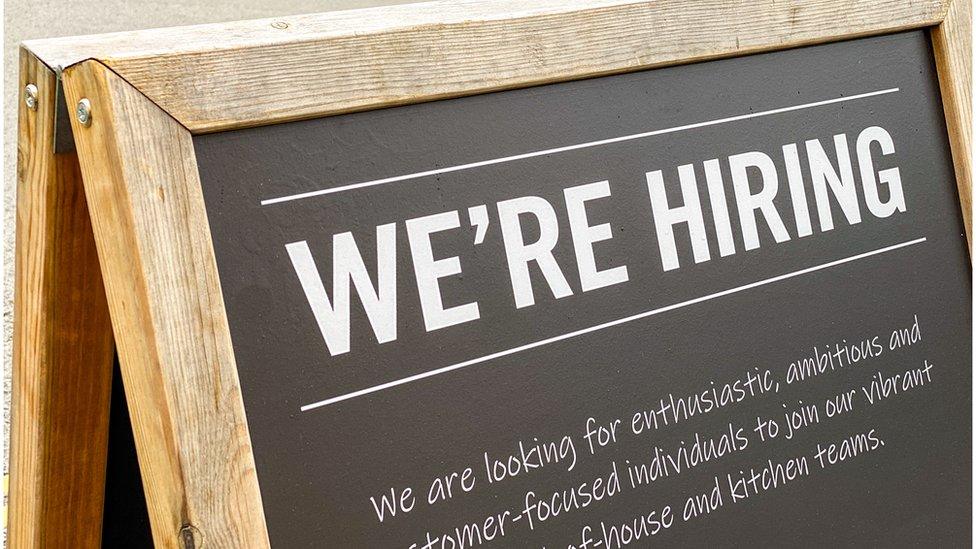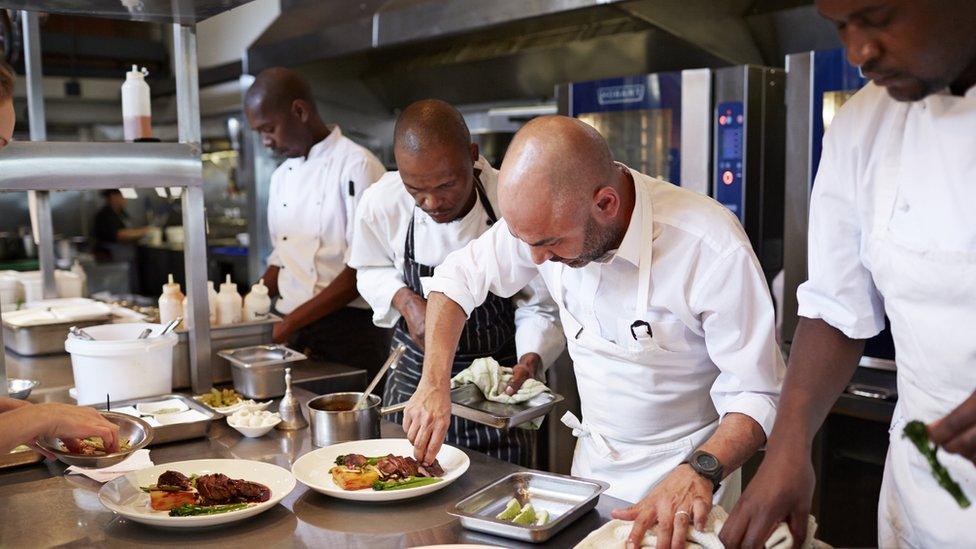Starter salaries rising amid candidate shortages
- Published
- comments

Job starting salaries are rising at record rates due to shortages in candidates, according to KPMG.
Rising demand for staff to fill vacancies resulted in the sharpest salary inflation rate in almost 24 years of data collection, its jobs survey found.
However, ongoing uncertainty over job security concerns caused a "severe drop" in candidates in July, it said.
Candidate numbers fell at the second-fastest rate in the survey's history.
The lack of available candidates continued to decline rapidly in July, driven by "concerns over job security due to the pandemic, a lack of European workers due to Brexit, and a generally low unemployment rate", the report by KPMG and the Recruitment and Employment Confederation (REC) said.
The BBC has approached the Home Office for comment.
Claire Warnes, partner and head of education, skills and productivity at KPMG UK, said job seekers should be "taking advantage" of the bounce in salaries for new recruits.
Companies were wanting to invest in their businesses now coronavirus restrictions had been eased but demand for new staff outstripped supply, she added.
"We know that reskilling and upskilling is needed to help people move between sectors, and there's no doubt the 'pingdemic' has added an extra dimension to the recruitment challenge," said Ms Warnes.
"Plus, with furlough due to end soon, there may be a downward pressure on pay to come."
'Good time to be looking for a new job'
Kate Shoesmith, deputy chief executive of the REC, said the data confirmed that it was now a "good time to be looking for a new job".
"Employers are desperate to find good candidates for the many jobs on offer and this is reflected in starting salaries rising at the sharpest rate since the survey began in 1997," she said.
"This will likely motivate more people to be on the lookout for new opportunities. The same goes for those on temporary contracts which are also seeing increased pay."
Several industries, including the hospitality and haulage sectors, are experiencing chronic shortages in workers.
Some of the many skilled jobs in short supply include chefs, software engineers, technicians and carers.

The report found latest vacancy data indicated faster increases in demand for both permanent and temporary workers in July.
The report said the removal of Covid restrictions had led to a "sharp increase" in the number of people employed into permanent job roles, while the upturn in temporary vacancies was the steepest since November 1997.
July survey data signalled an upturn in demand for temporary workers as well. So-called "blue collar" workers remained at the top of the rankings, followed closely by hotel and catering staff.
Jobs in IT and computing, hotel and catering and engineering were in high demand for permanent roles, while retail vacancies were the least in demand.
In the private sector, demand for permanent staff expanded at a slightly quicker pace than for temporary workers. In contrast, short-term vacancies rose more quickly than permanent roles in the public sector.
However, Ms Shoesmith warned pay increases alone won't meet the demand built up over recent months.
"We need an immigration system that flexes to meet demand as was promised, and business and government need a long-term plan for skilling up workers," she said.
"Skills shortages have been with us for a while and as our data shows are getting worse."

INSTATRADERS: Is foreign exchange trading a trustworthy route to extra cash?
THE EVERYDAY HUSTLE: What are the first steps to becoming financially independent?

- Published4 June 2021

- Published30 April 2021
